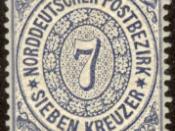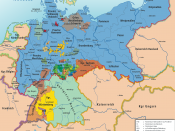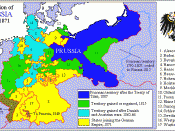Bismarck and German Unification.
In 1861 Parliament had granted the government additional funds for reforms, but in 1862 it refused to do so without a reduction of compulsory military service from three to two years. King William I would not yield for fear that the draftees would be insufficiently imbued with conservative values; for that very reason, the liberal-dominated Parliament insisted on this concession. In order to break the stalemate Bismarck was named minister-president.
He proceeded to collect the additional taxes on the basis of the 1861 budget, arguing that because the constitution did not provide for the case of an impasse he would have to apply the preceding year's budget. To justify the increase of the army, he clamed that German unification would only be settled by iron and blood.
"The importance of a state is measured by the number of soldiers it can put into the field of battle.
It is the destiny of the weak to be devoured by the strong". "The great questions of the day will not be decided by speeches and the resolutions of the majorities - ... - but by iron and blood"
Public opinion began shifting to his side in 1864, when he used the expanded Prussian army, in alliance with Austria, to wrest the provinces of Schleswig and Holstein from Denmark. Two years later he escalated a Prusso-Austrian quarrel over these spoils into a war against Austria and other German states. After their defeat in a whirlwind campaign, he incorporated Schleswig-Holstein, Hannover, and some other territories into Prussia. He also united all north and central German states into the North German Confederation, under Prussian leadership.
Faced with these achievements, the Prussian Parliament bowed to him and retroactively sanctioned his financial improvisations of the preceding four years. In 1870 Bismarck trapped...



Good, but good be great
You have a very good knowledge of the facts, but to get top grades you must look at themes throughout the period including more long term causes e.g. the vienna settlement of 1815.
5 out of 5 people found this comment useful.